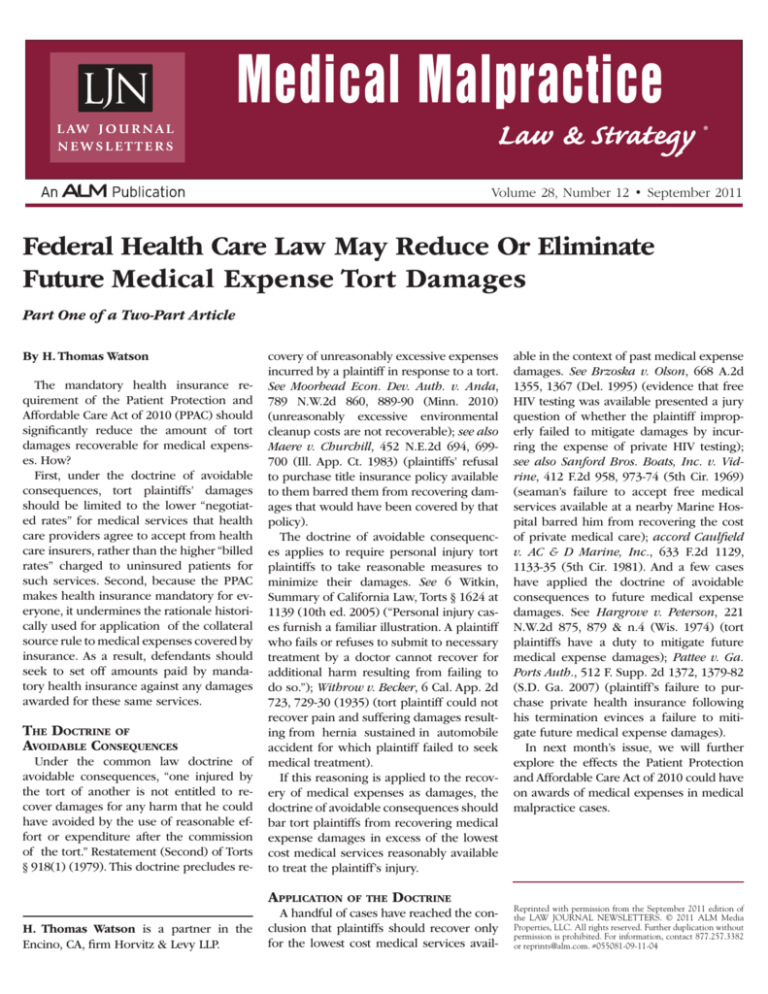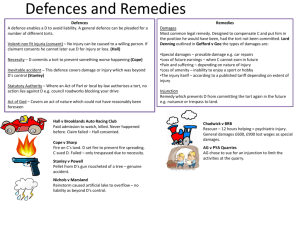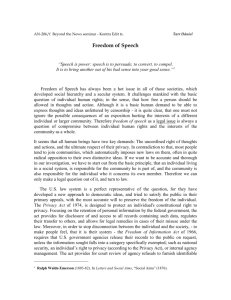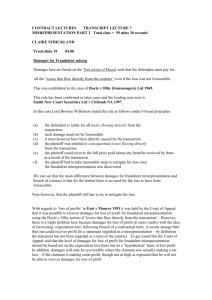
Medical Malpractice
Law & Strategy
®
Volume 28, Number 12 • September 2011
Federal Health Care Law May Reduce Or Eliminate
Future Medical Expense Tort Damages
Part One of a Two-Part Article
By H. Thomas Watson
The mandatory health insurance requirement of the Patient Protection and
Affordable Care Act of 2010 (PPAC) should
significantly reduce the amount of tort
damages recoverable for medical expenses. How?
First, under the doctrine of avoidable
consequences, tort plaintiffs’ damages
should be limited to the lower “negotiated rates” for medical services that health
care providers agree to accept from health
care insurers, rather than the higher “billed
rates” charged to uninsured patients for
such services. Second, because the PPAC
makes health insurance mandatory for everyone, it undermines the rationale historically used for application of the collateral
source rule to medical expenses covered by
insurance. As a result, defendants should
seek to set off amounts paid by mandatory health insurance against any damages
awarded for these same services.
The Doctrine of
Avoidable Consequences
Under the common law doctrine of
avoidable consequences, “one injured by
the tort of another is not entitled to recover damages for any harm that he could
have avoided by the use of reasonable effort or expenditure after the commission
of the tort.” Restatement (Second) of Torts
§ 918(1) (1979). This doctrine precludes re-
covery of unreasonably excessive expenses
incurred by a plaintiff in response to a tort.
See Moorhead Econ. Dev. Auth. v. Anda,
789 N.W.2d 860, 889-90 (Minn. 2010)
(unreasonably excessive environmental
cleanup costs are not recoverable); see also
Maere v. Churchill, 452 N.E.2d 694, 699700 (Ill. App. Ct. 1983) (plaintiffs’ refusal
to purchase title insurance policy available
to them barred them from recovering damages that would have been covered by that
policy).
The doctrine of avoidable consequences applies to require personal injury tort
plaintiffs to take reasonable measures to
minimize their damages. See 6 Witkin,
Summary of California Law, Torts § 1624 at
1139 (10th ed. 2005) (“Personal injury cases furnish a familiar illustration. A plaintiff
who fails or refuses to submit to necessary
treatment by a doctor cannot recover for
additional harm resulting from failing to
do so.”); Withrow v. Becker, 6 Cal. App. 2d
723, 729-30 (1935) (tort plaintiff could not
recover pain and suffering damages resulting from hernia sustained in automobile
accident for which plaintiff failed to seek
medical treatment).
If this reasoning is applied to the recovery of medical expenses as damages, the
doctrine of avoidable consequences should
bar tort plaintiffs from recovering medical
expense damages in excess of the lowest
cost medical services reasonably available
to treat the plaintiff’s injury.
Application of the Doctrine
H. Thomas Watson is a partner in the
Encino, CA, firm Horvitz & Levy LLP.
A handful of cases have reached the conclusion that plaintiffs should recover only
for the lowest cost medical services avail-
able in the context of past medical expense
damages. See Brzoska v. Olson, 668 A.2d
1355, 1367 (Del. 1995) (evidence that free
HIV testing was available presented a jury
question of whether the plaintiff improperly failed to mitigate damages by incurring the expense of private HIV testing);
see also Sanford Bros. Boats, Inc. v. Vidrine, 412 F.2d 958, 973-74 (5th Cir. 1969)
(seaman’s failure to accept free medical
services available at a nearby Marine Hospital barred him from recovering the cost
of private medical care); accord Caulfield
v. AC & D Marine, Inc., 633 F.2d 1129,
1133-35 (5th Cir. 1981). And a few cases
have applied the doctrine of avoidable
consequences to future medical expense
damages. See Hargrove v. Peterson, 221
N.W.2d 875, 879 & n.4 (Wis. 1974) (tort
plaintiffs have a duty to mitigate future
medical expense damages); Pattee v. Ga.
Ports Auth., 512 F. Supp. 2d 1372, 1379-82
(S.D. Ga. 2007) (plaintiff’s failure to purchase private health insurance following
his termination evinces a failure to mitigate future medical expense damages).
In next month’s issue, we will further
explore the effects the Patient Protection
and Affordable Care Act of 2010 could have
on awards of medical expenses in medical
malpractice cases.
Reprinted with permission from the September 2011 edition of
the Law Journal Newsletters. © 2011 ALM Media
Properties, LLC. All rights reserved. Further duplication without
permission is prohibited. For information, contact 877.257.3382
or reprints@alm.com. #055081-09-11-04











